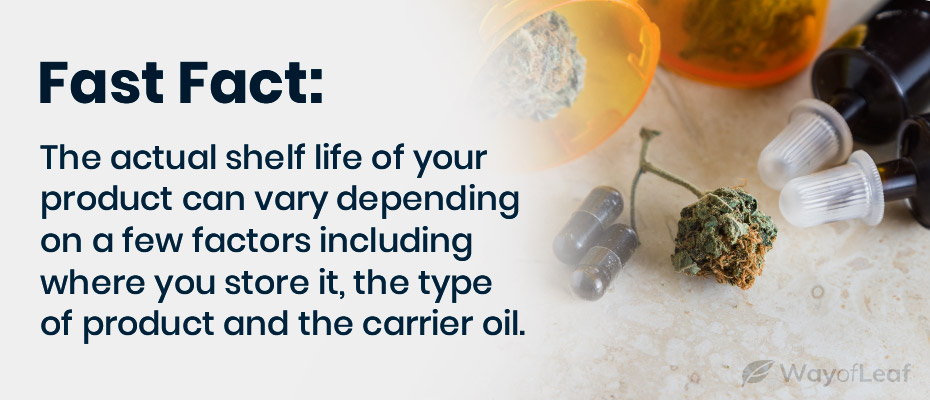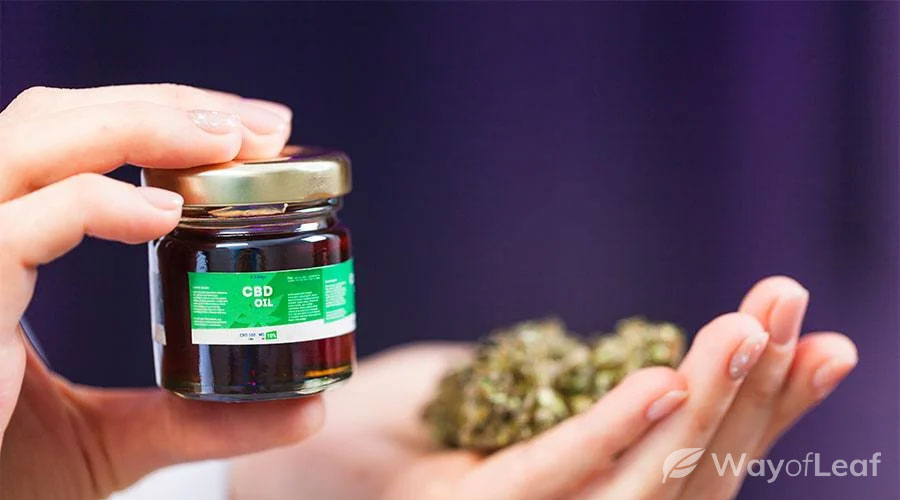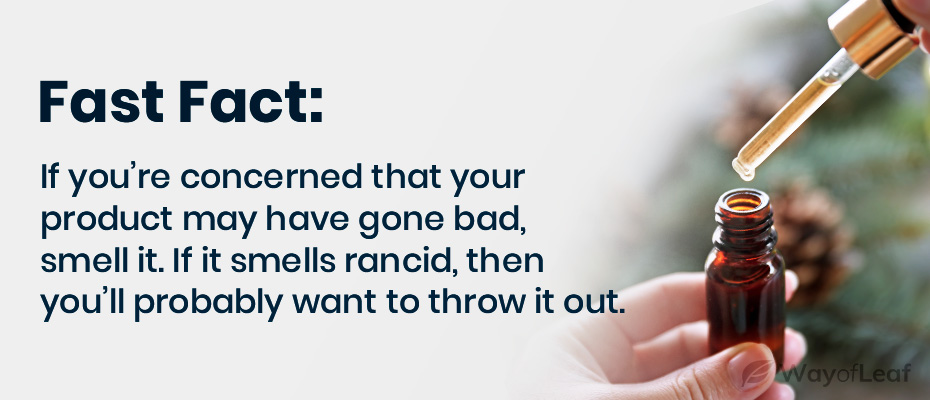Like any other packaged product, CBD oil has a shelf life, a window of time where the product is at its safest and most effective. However, it is sometimes challenging to determine this shelf life. How long CBD oil, or any cannabis product, lasts depends on several factors. These can range from the quality and classification of the starting material to the packaging and storage of the final product.
Taking proper care of your CBD products will help to preserve their cannabinoid content, as well as the quality of their other natural constituents. Whether it’s pure oil, liquid concentrate, or capsules, it’s important to protect your product from exposure to elements like heat, extreme cold, and humidity to preserve the natural botanical properties.
Storing CBD oil products properly and with care will help maintain their freshness and improve their shelf life. However, the brand or type of CBD product you get will also affect the length of time it remains useful. This article looks into the shelf life of CBD oil and provides storage tips.
Does CBD Oil Expire?
Yes. When you purchase any CBD product, you should see an expiration date. However, this date is not a definitive guide as to when you should stop using it. Storing CBD oil properly plays a big part in determining whether you can use it after the expiry date.
The biggest enemies of storage include light, heat, and air. We explore their likely effects on your products a little later on. First, let’s outline a few other important factors:
- Product Standard: High-quality CBD oil tends to last longer due to superior growth conditions and hemp plant quality.
- Ingredients: Each ingredient has its own shelf life. Therefore, the fewer ‘extras,’ the better. Carefully analyze the contents of each product, and check the certificates of analysis (COAs) to ensure there is no mold or heavy metals.
- Packaging: Steer clear of transparent glass containers. Premium quality brands use opaque bottles to shield CBD oil from light.
- Extraction: The method of extraction affects the stability of the cannabinoids, a fact we outline below.
Factors such as dosage and frequency of use also dictate when a CBD product expires. In addition, while some infusions and extracts may experience degradation in a short period, others may stay fresh and usable indefinitely.
However, the consensus is that the average shelf life of CBD oil is between 12 and 24 months, depending on how well you store it. If you still have your product after two years, you should replace it, as the active ingredients may become less effective.
The Impact of Extraction Method on CBD Oil Shelf Life
While CBD extraction methods aren’t standardized, there are some pros and cons to each technique. Many of these techniques may significantly impact CBD’s shelf life.

CO2 Extraction
The most common way to extract CBD includes the use of naturally-occurring CO2. This extraction method is believed to produce the cleanest, highest quality product, containing cannabinoids, flavonoids, phytochemicals, and terpenes.
The CO2 method includes the use of closed, pressurized chambers. Each chamber contains a different component. One chamber holds the hemp plant while another holds CO2. When CO2 is pushed into the hemp plant’s chamber, the CBD separates from the plant. The cannabinoid is then extracted in the form of a potent CBD oil.
Products made from this method may have greater usability for a longer period due to the high amount of CBD.
Steam Extraction
With steam distillation, water is heated to create vapor. The vapor is then cycled over the hemp plant, causing a breakdown of its cell walls and releasing its oils.
The oils mix with the water and the oil is later separated. The oil is rich in CBD, but this technique doesn’t yield as much CBD as CO2 extraction and can be extremely cumbersome. The use of steam is regarded as much safer than solvent extraction methods, though, and ultimately may lead to more stable CBD.
Solvent Extraction
A less popular method includes the use of solvents. For example, the ultrasound-assisted extraction (UAE) method relies heavily on solvents to extract any number of compounds. Solvents including butane are used to release the oils in the hemp plant. It is the least preferred method among CBD enthusiasts.
This is due to the lower quality of CBD oil extracted and the potentially dangerous by-products. Trace amounts of solvents could impact the overall shelf life of the extracted CBD oil.
As a consumer, you need to investigate how CBD oil is extracted. You may want to choose a form that yields a more natural oil and very little chemical residue for best results.
The Best Way to Store Your CBD Oil
The biggest perceived threats to any cannabidiol product, whether it is shatter, budder, wax, or CBD oil, are all the same: heat, light, time, and exposure to air.

Storing CBD oils correctly can result in longer shelf life. Proper storage can discourage the degradation of oils and the proliferation of other chemicals that can destroy the compound.
Factors such as moisture, temperature, and direct sunlight can affect how long CBD oil lasts. Here are some basic storage tips.
Store Your CBD Oil Away from Light and Heat
It’s important to store your CBD oil in a cool, dry, dark spot for maximum freshness and to keep it from degrading. Avoid keeping your CBD oil on a shelf or ledge near a window that receives sunlight or in a cabinet where appliances produce heat.
If possible, keep all CBD oils in a pantry or closet that remains below 70 degrees Fahrenheit. It isn’t necessary to store your product in the fridge, though one study suggests it could help increase shelf life. The researchers found that dried cannabis material stored in a fridge degraded more slowly than samples kept at 72 degrees Fahrenheit.
However, if the oil gets too cold, it might thicken to the point where you need to heat it a little before use. One option is to place the bottle in some warm water.
Freezing may create cloudiness and increase the thickness. However, if you’re looking to keep your CBD oil for an extended time, freezing it may help maximize the storage life. You should, however, consult with the brand that provides the CBD oil or read product instructions as different products may have different guidelines.
One additional way to protect your CBD oil from light is to wrap the dropper bottle with aluminum foil. However, most CBD oils already come in dark-colored, airtight bottles.
Avoid Air Exposure When Storing CBD Oil
Most CBD oil products come in oral applicators or airtight bottles designed to prevent air exposure. Like heat and light, air exposure plays a big part in the breakdown of natural cannabinoids like CBD. If possible, keep your CBD oil in its original container. If you need to transfer it, ensure the new container is suitable for long-term storage. Also, always fully tighten or seal the lid to extend the shelf life after each use.
Air exposure can significantly reduce the oil’s effectiveness because exposure to oxygen slowly changes its chemical balance. The process is known as “oxidative stress” and defines the altering changes of the oil as it is exposed to oxygen over time.
Most methods of extraction and bottling processes take the heat and air exposure into account when trying to maximize the effectiveness of the oil once sold to customers. Without these protections in place, you would be consuming low-quality CBD oils.
The safest way to store your CBD oil is in an upright position in a place with a stable temperature and away from extreme heat, light, or moisture. Your pantry is the perfect place!
When deciding how to store your CBD oil, you should take note of the carrier liquid used. Common options include MCT oil, olive oil, coconut oil, and hemp seed oil. You need to store your CBD oil as you would a bottle of coconut oil or olive oil.
Overall, the fridge is a good option if you seldom use CBD and want it to last over a year. Otherwise, your pantry works well as long as you seal the container after each use.
How Long Does CBD Oil Last? – The Research
It seems as if 24 months represents the best-case scenario when storing CBD oil. Ultimately, it is an organic molecule that is susceptible to change or degradation. A 1976 study found that exposing CBD in chloroform or ethanol to light resulted in almost total degradation in just three weeks! The CBD was stored in clear glass containers at room temperature.
The issue of temperature is once again worth noting. A study published in 2018 focused on hemp seed oil and CBDA. When the material was stored at 77 degrees Fahrenheit, half of the cannabinoid content was lost within two months. However, it took 20 months to lose 50% of the cannabinoids when stored at 41 degrees.
Ultimately, you won’t feel the same effects from using CBD after a long period of storage.
How Long Is CBD Good for When Opened?
That depends on how you store it! However, the evidence suggests that CBD will lose its efficacy when used many months after being opened. A study published in Scientific Reports in 2020 outlined how quickly CBD degrades in the wrong conditions.

When stored at 98 degrees Fahrenheit (37 degrees Celsius), up to 20% of the CBD degraded on average in just 30 days. The effect of light was lower but still averaged degradation of 15% over the same timeframe.
Although you shouldn’t experience illness from using expired CBD oil, you might find it unusable. Here are a few signs that your CBD oil has gone bad and must be thrown out:
- Skunky Smell: If your CBD oil has a potent skunky smell, it is best to dispose of it. Fresh oil smells earthy and mild.
- Viscosity: A thick and dark oil is almost certainly significantly degraded. Leave it at room temperature for a few minutes after taking the oil out of the fridge. It should lose its cloudiness and resemble the oil you buy fresh from the store. However, if the CBD oil remains cloudy, dark, and thick, get rid of it!
- Awful Taste: Unflavored CBD oil has a slightly bitter and earthy taste. However, if it has a sour flavor, dump it!
Final Thoughts on the Shelf Life of CBD Oil
Proper and careful care of your CBD oil will make a world of difference in terms of its potency and longevity. Take the required steps to store your oil in a place that will preserve its constituents. If you don’t need to keep your CBD oil for an extended period, storing it in a cool, dry, dark place is sufficient.
Those who need it stored for longer can wrap the container in aluminum foil and store it in the fridge or freezer. Generally, CBD oil should last between 12 and 24 months. As time passes, the concentrates in the oil will begin to change, and the oil may become darker. While it is still safe to use at that stage, you may need a larger dose for effectiveness.
However, as long as you do your research and read the product instructions, you shouldn’t have any problems storing CBD oil. Use it within a reasonable period, and you should get the most out of your products.









![How to Determine Which CBD Oil Potency Fits You [BEGINNERS GUIDE]](https://wayofleaf.com/wp-content/uploads/2019/03/wol_which-cbd-oil-potency-fits-you_1920x450-640x225.jpg)


